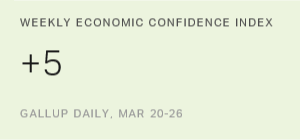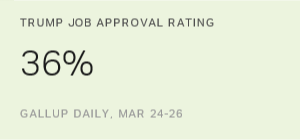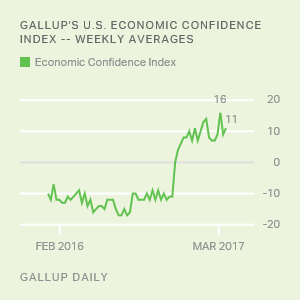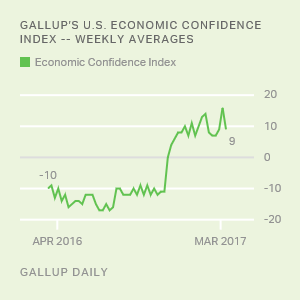Story Highlights
- Index falls six points to +5
- Larger drops among Republicans, independents
- Current conditions component falls seven points
WASHINGTON, D.C. -- Americans' confidence in the U.S. economy tumbled along with the Dow Jones industrial average last week. Though still in positive territory, Gallup's U.S. Economic Confidence Index (ECI) dropped six points to a score of +5 for the week ending March 26. This is the lowest weekly average since the presidential election in November.
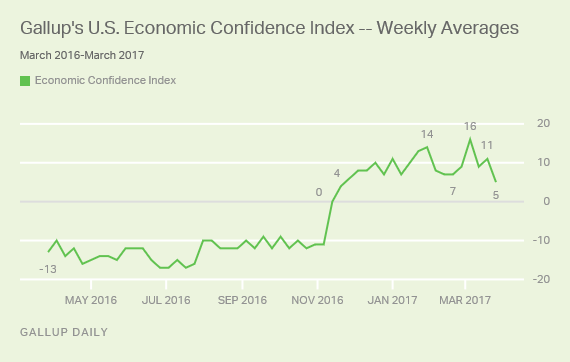
Americans' falling confidence in the economy may be tied to events in Washington and on Wall Street. Last week, the Dow logged its worst week since September as congressional Republicans ultimately failed to vote on legislation that would repeal and replace the Affordable Care Act. However, confidence waned prior to the effort to replace the ACA dying in Congress on Friday. This suggests that the broader GOP infighting earlier in the week, rather than the decision to pull the bill itself, may have been a factor, in addition to the market's poor performance.
Still, confidence did not drop evenly across party lines. Rank-and-file Republicans became significantly less confident in the economy last week, with their index score falling to a still-robust +42 from +52 the week before. Independents, too, lost confidence, with their score retreating back into negative territory to -1 from +6 the previous week. Democrats' confidence in the economy changed little, with their current -20 score similar to the -18 they had in the week prior.
Gallup's U.S. Economic Confidence Index is the average of two components: how Americans rate current economic conditions and whether they feel the economy is improving or getting worse. The index has a theoretical maximum of +100 if all Americans were to say the economy is doing well and improving and a theoretical minimum of -100 if all were to say the economy is doing poorly and getting worse.
Americans' assessments of current economic conditions took a seven-point hit for the week ending March 26 after reaching a high of +17 in the prior week. This loss marked the largest drop for this component since the federal government shutdown in October 2013. The current +10 score is the result of 32% of Americans rating the economy "excellent" or "good," and 22% rating it "poor."
Meanwhile, the economic outlook component of the ECI fell five points, but enough to send this component back into the negative territory for the first time since the election. Americans' economic outlook had already dropped significantly in March. The current -1 score is the result of 46% of Americans saying the economy is "getting better," and 47% saying it is "getting worse."
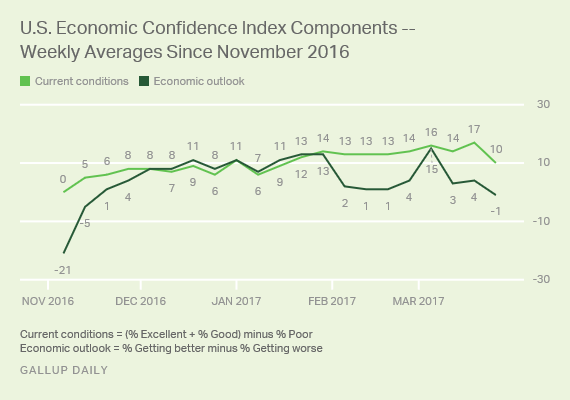
Bottom Line
A rocky week on Wall Street may have hurt Americans' confidence in the economy's health. The failure of Republicans to repeal the ACA didn't seem to immediately affect confidence further, at least in the short term. However, if losses on Wall Street continue this week, the situation may contribute to further erode confidence in the coming days. If confidence does fall more, it may result in Americans' net evaluation of the economy growing more negative than positive for the first time since the election.
Donald Trump's election spurred a renewed level of confidence among his fellow Republicans, which boosted the overall average for the index into positive territory. But, if his supporters perceive that the promises he made during the campaign are not being kept, or if Republicans lose faith in Trump's negotiating prowess, the party rank and file could become further depressed.
These data are available in Gallup Analytics.
Gallup.com reports results from these indexes in daily, weekly, and monthly averages and in Gallup.com stories. Complete trend data are always available to view in the following charts:
Daily: Employment, Economic Confidence, Job Creation, Consumer Spending
Weekly: Employment, Economic Confidence, Job Creation, Consumer Spending
Read more about Gallup's economic measures.
View our economic release schedule.
Survey Methods
Results for this Gallup poll are based on telephone interviews conducted March 20-26, 2017, on the Gallup U.S. Daily survey, with a random sample of 3,547 adults, aged 18 and older, living in all 50 U.S. states and the District of Columbia. For results based on the total sample of national adults, the margin of sampling error is ±2 percentage points at the 95% confidence level. All reported margins of sampling error include computed design effects for weighting.
Each sample of national adults includes a minimum quota of 70% cellphone respondents and 30% landline respondents, with additional minimum quotas by time zone within region. Landline and cellular telephone numbers are selected using random-digit-dial methods.
Learn more about how the Gallup U.S. Daily works.
